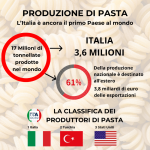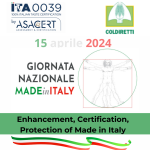Today, September 29 is International Food Loss and Waste Awareness Day.
Food waste has an estimated cost of about $750 billion. Fruit and vegetable losses result in the loss of as much as 912 trillion kilocalories and important micronutrients.
Wasting food also means wasting all the resources used in its production:
– We dissipate 253 cubic kilometers of precious drinking water.
– We occupy and exploit in vain 1.4 billion hectares of agricultural land (equivalent to 30 percent of the world’s agricultural area), in many cases subject to intensive use of pesticides. In addition, greenhouse gas emissions related to food dispersal amount to about 3.3 billion tons, plus emissions from the food fermentation process at disposal sites.
Globally, an estimated 13.2 percent of food production is wasted after the harvesting process and before reaching store shelves, while an additional 17 percent ends up unused in households, food services, and the retail stage. The 2030 Agenda for Sustainable Development sets as a goal the drastic reduction of global food waste per individual, both during retail operations and during consumption, as well as the reduction of losses along production and distribution chains.
Food wastage (food waste) also occurs at the final stages of the supply chain, i.e., in households, food services and retail. To get a clearer perspective of the extent of this waste, let’s calculate that each of us generates an average of 74 kg of food waste each year. The wastage is mainly concentrated in high- and middle-income regions, especially at the household level, where 570 million tons of food out of a total of 913 is thrown away.
Reducing food loss and waste plays a key role in ensuring better nutrition for present and future generations. Such reduction presents itself as a triple opportunity: it contributes to climate change mitigation, ensures the availability of nutritious food, and improves the overall sustainability of our agri-food systems.
Striving to significantly reduce food waste to limit environmental impact and control our Planet’s ever-increasing temperature rise is one of the goals of the United Nations 2030 Agenda. Goal 2: Defeat hunger; Goal 3: Health and well-being; Goal 12: Responsible consumption and production.
Responsible consumption and production, in particular, aim to “do more and better with less,” increasing the benefits that can be derived from economic activities. To make this possible, it is necessary to adopt a systematic and cooperative approach among players in the supply chain. Creating a network of connections between producer, farmer and consumer is precisely why the ITA0039 APP was created. Among the goals of the application: to raise awareness of sustainable lifestyles, offering adequate information on the origin of products purchased, quality and labels, involving consumers in the activity of supporting and protecting Made in Italy. An ongoing work of dissemination and awareness, because we are convinced that the most dangerous waste is the one we are unable to recognize.






